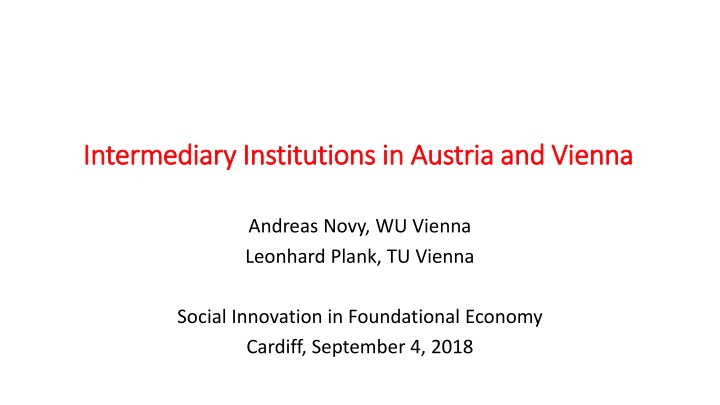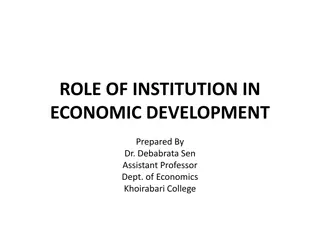Intermediary Institutions in Austria and Vienna: Understanding their Role
Intermediary institutions in Austria and Vienna play a crucial role in shaping societal dynamics through contestatory views, participation in governance, and commitment to the common good. This article explores the significance of intermediary organizations like Civil Society Organisations (CSOs) and local authorities in fostering innovation, critiquing systems, and building a democratic sphere that promotes collective well-being and social-ecological infrastructure.
Download Presentation

Please find below an Image/Link to download the presentation.
The content on the website is provided AS IS for your information and personal use only. It may not be sold, licensed, or shared on other websites without obtaining consent from the author.If you encounter any issues during the download, it is possible that the publisher has removed the file from their server.
You are allowed to download the files provided on this website for personal or commercial use, subject to the condition that they are used lawfully. All files are the property of their respective owners.
The content on the website is provided AS IS for your information and personal use only. It may not be sold, licensed, or shared on other websites without obtaining consent from the author.
E N D
Presentation Transcript
Intermediary Intermediary Institutions Institutions in Austria and Vienna in Austria and Vienna Andreas Novy, WU Vienna Leonhard Plank, TU Vienna Social Innovation in Foundational Economy Cardiff, September 4, 2018
Intermediary institutions are a contested concept: About About which intermediary intermediary institutions are are we we talking talking? ? which institutions
Intermediary Intermediary institutions institutions reduced reduced to to Civil Civil Society Society Organisations Organisations Liberal tradtion of civil society versus the state: eg. Friedrich Hayek <Organisations of civil society> participate in the supply of collective goods for particular groups. In competing with the public sector, they provide alternatives to the inefficiency of monopolies (Hayek 1979: 49-50). (74) Intermediary institutions/CSOs as cornerstones in a competitive-based market society
Intermediary Intermediary institutions institutions and experimental and experimental governance governance American Progressives (Dewey, Brandeis, cf. Rahman): contestatory and participatory view of politics => critique is crucial for innovation Intermediary institutions constitute an enlarged state (Gramsci): Civil society organisations (CSOs) with a public commitment and/or commited to the common good, but also (Local) Authorities as organizers of a decommodified social- ecological infrastructure => The public realm as the cornerstone of a democratic sphere
Contextualizing Contextualizing Red Red Vienna Vienna The range of progressive alliances are unimaginably wider now than was conceivable in the Vienna of the 1920s or Bologna of the 1970s: alliances of traditional male-dominated groups of workers and intellectuals have given way to a spectrum that encompasses advocates for ethnic minority, gender, LGBT and disability rights. Moreover, there is a more straightforward difference that should give us grounds for optimism: our societies, for all the destruction of the great financial crisis, are much wealthier than in the past. Many things stand in the way of recreating a foundational economy that fosters human capability and flourishing. Scarcity of resource is not one of them. As Europeans, why not start out now on foundational renewal, rediscover an experimental tradition and reinvent radical political practice in a way that cannot be extinguished. (Foundational Economy Collective, 2018, last page)
Vienna Vienna between between East and West East and West In the East the State was everything, civil society was primordial and gelatinous; in the West, there was a proper relation between State and civil society (Gramsci 1971: 238). Centre-Periphery relationship in Europe: Different forms of urbanization and underdeveloped civil society in the East Different forms of intermediary institutions Counterreformation in Austria Prohibition of Reformation (and related liberal ideas and organisations) => Politico-Economic Dominance of Catholic Church Josephinism: Change from above (Emperor Joseph II 1780-1790)
Path Path- -dependency dependency of of Intermediary in Vienna and Austria in Vienna and Austria Intermediary Institutions Institutions Civil society institutions always related to the state Until today, NGOs receive most of their money from the state Political parties centred on (occupying) the state Strong corporatist tradition Social partnership (plus social peace ) Shop stewards anchored in Austrian constitution Still 95% of workers covered by collective bargaining agreements
History History of of Public Ownership in Public Ownership in Foundational Vienna and Austria Vienna and Austria FoundationalEconomy Economy Municipal Socialism of 19th century (municipalisation of large parts of Foundational Economy) executed by Christian-Social Party (and before Red Vienna [1919-1934] Water, sanitation, gas, electricity, public transport, Nationalisation (of German-owned industry) as centralization by nation state done by christian democracts after 1945 Covering mainly energy sector, telecommunications, banks and national industry
The continuting relevance of the Public sector for the FE The continuting relevance of the Public sector for the FE Austria: Units by controlling entity and type Federal (central) State (regional) Municipal Chambers Social Security (local) 2.178 93 2.167 11 4.280 91 6.458 184 Total Public Enterprise Non-Financial Corporations Financial Corporations Sector State (Core) Units Total 308 294 14 284 592 590 557 33 273 863 11 3.180 3.120 93 9 2 60 61 72 4.989 8.169 Source: Br thaler 2018 Public Sector remains important for delivering on foundational needs A shift towards corporatisation and outsourcing A high and increasing number of units and a variety of legal forms Reflecting the federal and corporatist state structure and the importance of the municipal level
Importance of collective intermediaries in Austria Importance of collective intermediaries in Austria s material FE s material FE Housing Central State Region (L nder) Water Supply Intermunicipal Cooperation Municipal Coops Energy 0% 20% 40% 60% 80% 100% Source: Own elaboration based on E-Controll2017; Getzner et al. 2018; Statisik Austria 2018 Sectoral variations, including degrees of centralisation and collective forms different/competing aims that intermediaries may pursue (Cumbers, 2012) Characteristic features of Austria s FE public-public partnerships (intermunicipal cooperation): (water, waste, schools) coops / limited-profit companies: (housing, energy, agriculture, finance) Stadtwerke (local multi-utilities): (energy, water, waste, transport)
Red Vienna: Beyond housing the many Red Vienna: Beyond housing the many
Red Vienna: Social Red Vienna: Social- -Ecological Infrastructure Ecological Infrastructure Relatively high level of output legitimation delivering for the many (see city rankings) 1 / 231 1 /87 2 / 140 2 / 25 3 / 55 10 / 500 14 / 42 1 / 69 Quality of Living Survey 2018 (Mercer) Smart City Index (Roland Berger) The EIU Livability Survey 2017 (EIU) Most liveable city Index 2017 (Monocle) World s Most Reputable Cities 2017 (Reputation Institute) Innovation Cities Index 2016/17 (2thinknow) Global Power City Index 2017 (Mori Foundation) State Of The World Cities 2012/2013 (UNO) But lacking input legitimation Left Josephines (Egon Matzner) Looking towards other cities that open up to the citizenry experimentalist governance, e.g. Grenoble, Barcelona, Amsterdam























